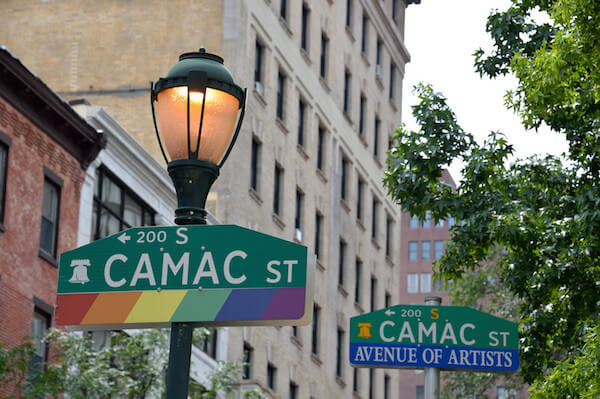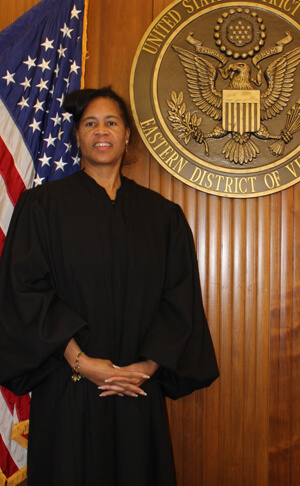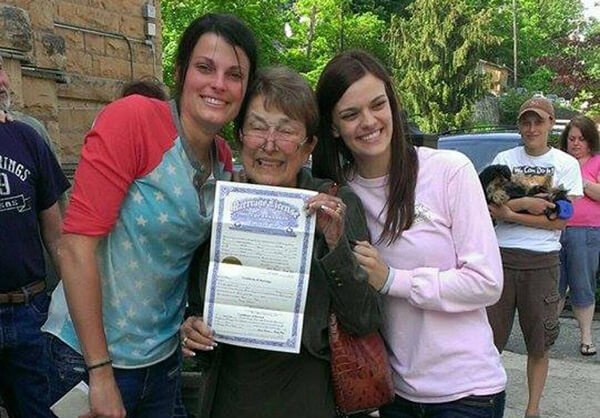April DeBoer, Jayne Rowse, and their children. | DEBOER ROWSE ADOPTION LEGAL FUND
A senior federal district court judge appointed by President Ronald Reagan in 1988 has ruled that a Michigan lesbian couple is entitled to a trial on their claim that the state adoption law, forbidding same-sex couples to jointly adopt children, and the Michigan Marriage Amendment, forbidding same-sex marriages, violate their rights under the 14th Amendment.
Judge Bernard A. Friedman, on July 1, rejected the state’s motion to dismiss the case, citing the Supreme Court’s June 26 decision striking down the Defense of Marriage Act’s ban on federal recognition of valid same-sex marriages to support the “plausibility” of the couple’s constitutional claim.
Federal ruling denying state’s effort to dismiss challenge to state gay marriage ban encourages plaintiffs
April DeBoer and Jayne Rowse, the plaintiffs, are both employed as nurses and have lived together for six years. Between them, they have adopted three children as single parents. They would like to jointly adopt the children to solidify their family relationship, but Michigan’s adoption law forbids it because they are not married and the Michigan Marriage Amendment (MMA) denies them the right to marry.
They filed suit in federal court, claiming that the state’s prohibition on joint adoptions by same-sex couples violates their equal protection rights. In pre-trial arguments, Judge Friedman suggested their challenge would not be complete if it were confined to the adoption law, and they amended their complaint at his suggestion to add a challenge to the state’s ban on same-sex marriage as well.
The state moved to dismiss, arguing that the plaintiffs cannot show that the Michigan Marriage Amendment lacks any rational relationship to a legitimate state interest and that there is no fundamental right under the Constitution for same-sex couples to marry.
Friedman denied the motion, holding that the claims cannot be decided as a matter of law at this point, largely because of the Supreme Court’s DOMA decision.
On one hand, he observed, there is language in Justice Anthony Kennedy’s opinion that the state of Michigan will cite about the state’s “historic and essential authority to define the marital relation.” Quoting Kennedy again, Friedman wrote, “They will couch the popular referendum that resulted in the passage of the MMA as ‘a proper exercise of [the state’s] sovereign authority within our federal system, all in the way that the Framers of the Constitution intended.’”
But referring to the high court’s 1996 Romer v. Evans ruling throwing out an anti-gay referendum in Colorado, its 2003 Lawrence v. Texas decision that struck down the nation’s remaining sodomy laws, and New York widow Edie Windsor’s victory over DOMA, Friedman noted the legal precedents DeBoer and Rowse can rely on in making their case.
“Plaintiffs are prepared to claim Windsor as their own; their briefs sure to be replete with references to the newly enthroned triumvirate of Romer v. Evans, Lawrence v. Texas, and now Windsor,” the judge wrote. “And why shouldn’t they? The Supreme Court has just invalidated a federal statute on equal protection grounds because it ‘place[d] same-sex couples in an unstable position of being in a second-tier marriage.’ Moreover, and of particular importance to this case, the justices expressed concern that the natural consequence of such discriminatory legislation would not only lead to the relegation of same-sex relationships to a form of second-tier status, but impair the rights of ‘tens of thousands of children now being raised by same-sex couples’ as well. This is exactly the type of harm plaintiffs seek to remedy in this case.”
The court’s role in deciding a motion to dismiss is to determine whether the plaintiffs have asserted a plausible legal claim, assuming their factual allegations to be true.
“Construing the facts in the light most favorable to plaintiffs, and in view of the Supreme Court’s current statement of the law, this Court cannot say that plaintiffs’ claims for relief are without plausibility,” Friedman concluded regarding their equal protection claim.
He added that the plaintiffs’ due process claim “will likewise move forward because it states a plausible claim for relief,” citing Judge Vaughn Walker’s original Proposition 8 decision, which stands as an unappealed district court opinion given the Supreme Court’s decision that those challenging it in higher courts lacked standing.
Friedman ordered that counsel meet with him on July 10 to set a trial date. From the tone of his opinion, he is eager to decide this case on the merits and seems well disposed toward the plaintiffs’ claims.



































